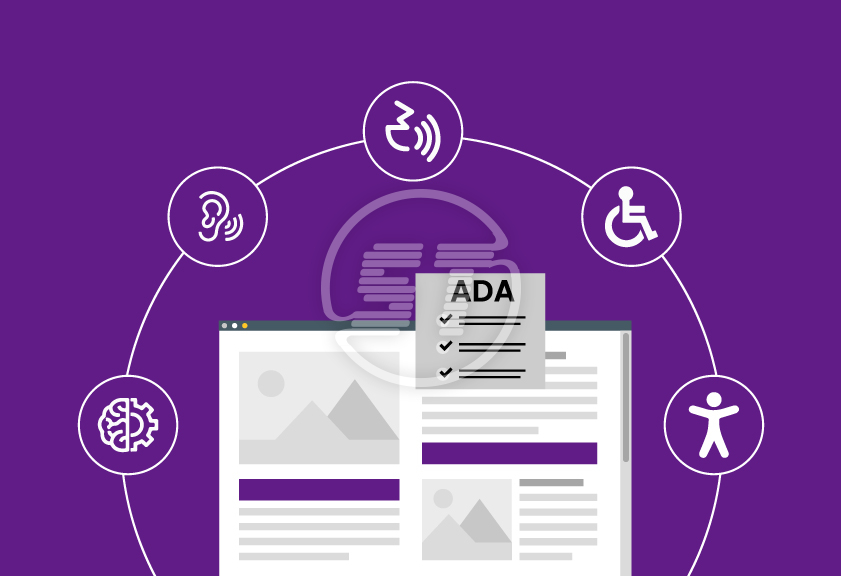What is the vital requirement of a digital-first world?
Ensuring that a website/application is accessible to all its visitors. Isn’t it?
However, despite laws are requiring businesses to make their digital products accessible, several websites and applications are still inaccessible. And that is the reason why the number of lawsuits is increasing rapidly. It has become a serious issue of concern for businesses to prevent their websites from litigations and that’s where ADA website compliance vendors come into the picture.
These vendors offer tools, services, and expertise to help businesses meet Web Content Accessibility Guidelines (WCAG) and stay ADA-compliant. However, with several vendors available in the market, choosing the right one for a business can be overwhelming. This article will help understand how to select the best ADA website compliance vendor according to the business's needs.
ADA compliance crucial for a website: reasons!
- It helps protecting websites legally.
- Provide equal access to all users, including those with visual, auditory, cognitive, or mobility impairments.
- Accessibility often improves site structure, its performance, and usability.
- Demonstrates corporate social responsibility and builds trust.
Categories of ADA compliance vendors!
Before evaluating vendors, it’s important to understand the categories they fall into:
- Automated scanning tools: Run scans to detect accessibility errors (e.g., Free Accessibility Checker, Skynet Accessibility Scanning and Monitoring, WAVE, axe, Tenon).
- AI-Powered overlays: Apply front-end fixes using scripts (e.g., All in One Accessibility)
- Full-service accessibility agencies: Offer manual audits, remediation, legal support, and ongoing monitoring (e.g., Skynet Technologies)
- CMS-specific vendors: Offer accessibility plugins or add-ons for platforms like WordPress, Shopify, or Magento.
Factors to evaluate when selecting an ADA EAA compliance vendor!
- Accuracy of audit
An inaccurate or surface-level audit can leave critical accessibility issues undetected, exposing organizations to legal risk.
What to look for:
- Combination of manual and automated testing. Because both testing processes are essential to understand the exact status of the website’s accessibility.
- Ensure that the ADA website compliance vendor has certified accessibility experts.
- Does their audit report include explanations, screenshots, core snippets, and WCAG violation references? Here's a manual accessibility audit report sample.
- Remediation capabilities
Detecting issues is just the first step – Fixing them is what actually ensures compliance.
What to look for:
- Check if the vendor has in-house remediation services to fix the issues whenever needed quickly.
- Get clarity on turnaround time.
- Ongoing monitoring and maintenance
Websites evolve regularly – new content, themes, plugins, or third-party tools keep introducing new accessibility barriers.
What to look for:
- Real-time for scheduled scanning of new content.
- Dashboards showing compliance status over time.
- Email alerts or reports when new violations are introduced.
- Ensure it doesn’t override manual work or interfere with UX.
- Legal support and documentation
A demand letter or lawsuit requires a quick and confident legal response with proof of accessibility efforts.
What to look for:
- They should be having some legal response templates or guidance.
- Documentation like audit logs, compliance roadmaps, VPATs, and accessibility statements.
- Access to legal consultants.
- User testing with people with disabilities
Only real users can accurately validate how accessible a website is in practice – not just in theory.
What to look for:
- User testing scenarios that reflect a website’s most common use cases (e.g., shopping, bookings, registrations).
- Diverse user group participation, including users relying on screen readers, keyboard-only navigation, voice commands, etc.
- Feedback loops from real users are used to improve both the design and functionality.
- Technology and CMS compatibility
The vendor must align with the tech stack to ensure seamless integration and no conflicts.
What to look for:
- Support for the CMS (e.g., WordPress, Shopify, Magento)
- Cross-browser and device compatibility testing.
- Accessibility of third-party plugins/widgets (e.g., chatbots, video players).
All in One Accessibility® supports over 700 platforms.
- Scalability and customization
A website and business may grow or change, and the accessibility solution should evolve accordingly.
What to look for:
- Flexible service tiers (e.g., single-page sites to enterprise platforms).
- Ability to customize the scope (e.g., audits only vs. full compliance programs).
- Multilingual support and global accessibility standards (e.g., EAA, AODA).
All in One Accessibility® supports 140+ languages.
- Cost and ROI
Budget is important, but so is the value a business gets in return – including legal risk reduction, improved UX, and SEO.
What to look for:
- Transparent pricing models (e.g., monthly subscriptions, audit-based pricing, tiered plans).
- Scope of services included at each price point.
- Measurable impact: Reduced bounce rate, improved conversion, fewer legal risks.
- Consulting and training
It is crucial to create an inclusive mindset and infuse accessibility best practices in the core process of web development across the teams. The right ADA vendor should empower the internal teams with knowledge and strategies to maintain long-term compliance and inclusivity.
What to look for:
- Expert consulting support to guide accessibility implementation tailored to the specific business model, platform, and industry.
- They offer customized training sessions or workshops for teams – live or on-demand.
- ADA vendors must provide resources such as handbooks, code examples, accessibility checklists, and role-specific guidelines.
- Also, right vendors support inclusive design thinking and integrating accessibility into the full product lifecycle.
Warning signs that shouldn’t be overlooked!
- Vendors are offering “100% ADA compliance guaranteed” overnight – true accessibility is complex and requiring continuous efforts.
- Relying solely on AI-based overlays - these may create a false sense of security and even interfere with user experience.
- Lack of transparency in reporting, methodology, or legal backing.
Questions to ask a vendor before signing up!
- What standards do they follow (e.g., WCAG 2.1, Section 508)?
- Do they offer manual audits or only automated tools? If yes, what tools and methods do they adhere to?
- What is their process for remediation?
- Do they have an in-house team to fix the issues or provide guidance to their clients’ developers?
- How do they ensure that fixes don’t affect the website’s design or performance?
- How frequently will a website be scanned for new accessibility issues?
- If a website develops new accessibility barriers, will organizations receive alerts?
- Do they support third-party widgets?
- Do they help respond to ADA lawsuits?
- Can they provide a compliance roadmap or timeline?
- What documentation do they provide for compliance?
- Do they conduct user testing with people with disabilities and what assistive technologies do their testers use?
- Will accessibility implementation affect site speed or SEO?
- How do they support ongoing compliance?
- Can they provide references or case studies?
- Can accessibility services be tailored based on website size or business requirements?
- What is the final pricing including everything? Are there any hidden charges?
Also read: The Role of AI in Digital Accessibility: Benefits, Risks & Compliance
In a nutshell,
Selecting the right ADA website compliance vendor isn’t just about ticking a legal box - it’s about building an inclusive, high-quality digital presence. By carefully evaluating vendors based on audit accuracy, remediation expertise, legal preparedness, and ongoing support, businesses can protect themselves while offering meaningful access to all users.
Remember: ADA, EAA, and WCAG compliance is a journey, not a checkbox. Pick a vendor that’s committed to walking that path with you.
Looking for a partner to make your website ADA, EAA, and WCAG compliant? We offer comprehensive digital accessibility remediation solutions tailored to your business needs - from automated widget to in-depth manual audits, remediation, VPAT/ ACR and support. With a proven track record across industries, our team helps you meet legal requirements while creating an inclusive experience for all users. Ready to select the right ADA EAA compliance vendor? Request a free quote or reach out [email protected].


